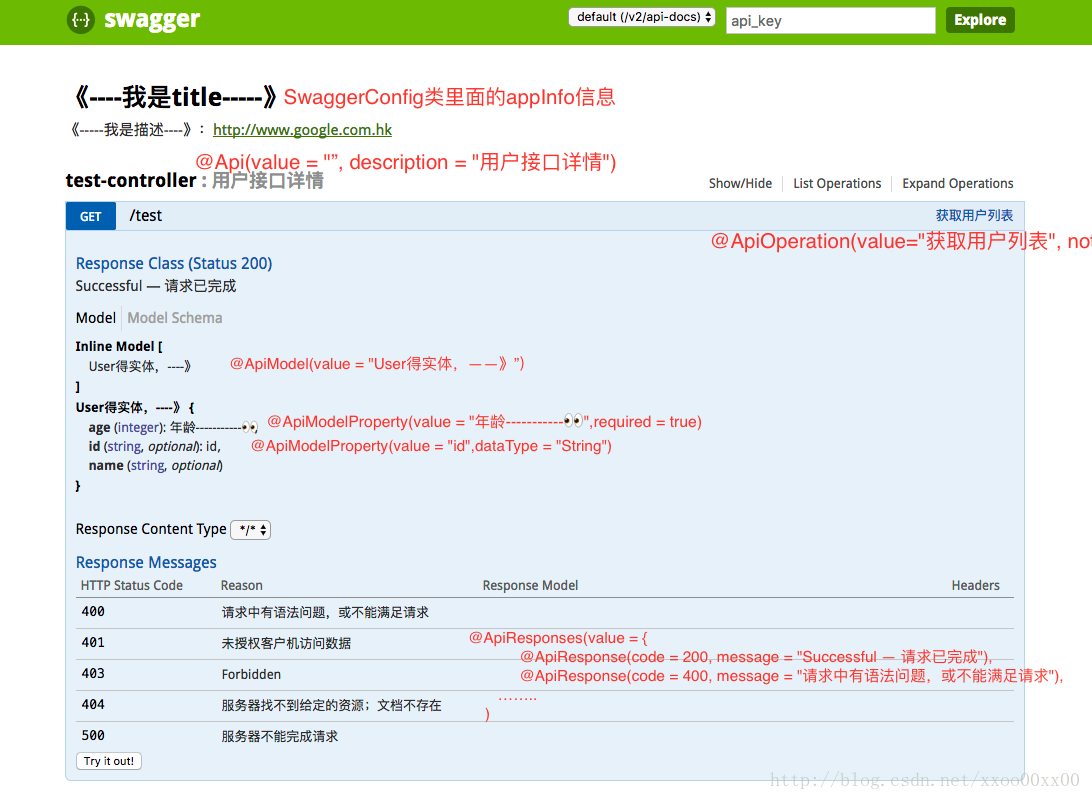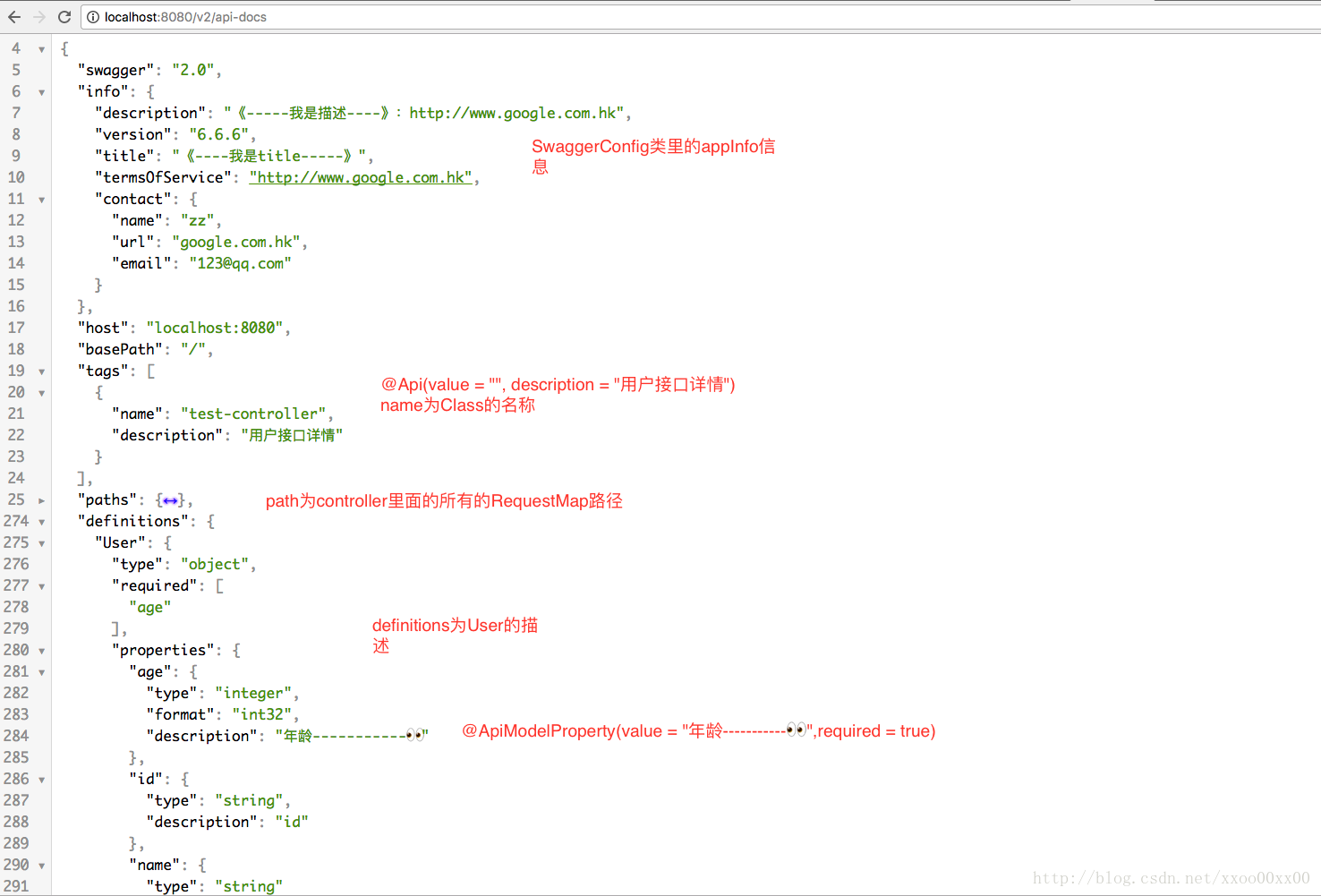swagger注释API详细说明
转载:https://blog.csdn.net/xupeng874395012/article/details/68946676
链接:https://www.jianshu.com/p/12f4394462d5
API详细说明
注释汇总
| 作用范围 | API | 使用位置 |
|---|---|---|
| 对象属性 | @ApiModelProperty | 用在出入参数对象的字段上 |
| 协议集描述 | @Api | 用于controller类上 |
| 协议描述 | @ApiOperation | 用在controller的方法上 |
| Response集 | @ApiResponses | 用在controller的方法上 |
| Response | @ApiResponse | 用在 @ApiResponses里边 |
| 非对象参数集 | @ApiImplicitParams | 用在controller的方法上 |
| 非对象参数描述 | @ApiImplicitParam | 用在@ApiImplicitParams的方法里边 |
| 描述返回对象的意义 | @ApiModel | 用在返回对象类上 |
作用在 controller 层:
/** Controller 层
* 取消发布
*/
@PostMapping("/exitpub")
@ApiOperation(value = "图书取消发布",produces = "application/json", consumes="application/json")
@RequiresPermissions("cms:bookresource:publish")
@ApiImplicitParam(name="ids",allowMultiple = true,value = "id数组",required=true,paramType = "body",dataType="Long")
public R unpublish(@PathVariable("ids") String[] ids){
作用在实体层 entity
@ApiModelProperty("编辑")
@TableField(exist = false)
private List<EditorEntity> editorList = new ArrayList<>();
@ApiImplicitParam
| 属性 | 取值 | 作用 |
|---|---|---|
| paramType | 查询参数类型 | |
| path | 以地址的形式提交数据 | |
| query | 直接跟参数完成自动映射赋值 | |
| body | 以流的形式提交 仅支持POST | |
| header | 参数在request headers 里边提交 | |
| form | 以form表单的形式提交 仅支持POST | |
| dataType | 参数的数据类型 只作为标志说明,并没有实际验证 | |
| Long | ||
| String | ||
| name | 接收参数名 | |
| value | 接收参数的意义描述 | |
| required | 参数是否必填 | |
| true | 必填 | |
| false | 非必填 | |
| defaultValue | 默认值 |
@ApiImplicitParam(name = "id",value = "资源id",required=false,paramType = "path",dataType="Long")
paramType 示例详解
path
@RequestMapping(value = "/findById1/{id}", method = RequestMethod.GET, produces = MediaType.APPLICATION_JSON_UTF8_VALUE)
@PathVariable(name = "id") Long id
body
@ApiImplicitParams({ @ApiImplicitParam(paramType = "body", dataType = "MessageParam", name = "param", value = "信息参数", required = true) })
@RequestMapping(value = "/findById3", method = RequestMethod.POST, produces = MediaType.APPLICATION_JSON_UTF8_VALUE, consumes = MediaType.APPLICATION_JSON_VALUE)
@RequestBody MessageParam param
提交的参数是这个对象的一个json,然后会自动解析到对应的字段上去,也可以通过流的形式接收当前的请求数据,但是这个和上面的接收方式仅能使用一个(用@RequestBody之后流就会关闭了)
header
@ApiImplicitParams({ @ApiImplicitParam(paramType = "header", dataType = "Long", name = "id", value = "信息id", required = true) })
String idstr = request.getHeader("id");
if (StringUtils.isNumeric(idstr)) {
id = Long.parseLong(idstr);
}
Form
@ApiImplicitParams({ @ApiImplicitParam(paramType = "form", dataType = "Long", name = "id", value = "信息id", required = true) })
@RequestMapping(value = "/findById5", method = RequestMethod.POST, produces = MediaType.APPLICATIO
常用 swagger 注解
常用到的注解有:
- Api
- ApiModel
- ApiModelProperty
- ApiOperation
- ApiParam
- ApiResponse
- ApiResponses
- ResponseHeader
1. api标记
Api 用在类上,说明该类的作用。可以标记一个Controller类做为swagger 文档资源,使用方式:
@Api(value = "/user", description = "Operations about user")与Controller注解并列使用。 属性配置:
| 属性名称 | 备注 |
|---|---|
| value | url的路径值 |
| tags | 如果设置这个值、value的值会被覆盖 |
| description | 对api资源的描述 |
| basePath | 基本路径可以不配置 |
| position | 如果配置多个Api 想改变显示的顺序位置 |
| produces | For example, "application/json, application/xml" |
| consumes | For example, "application/json, application/xml" |
| protocols | Possible values: http, https, ws, wss. |
| authorizations | 高级特性认证时配置 |
| hidden | 配置为true 将在文档中隐藏 |
在SpringMvc中的配置如下:
@Controller
@RequestMapping(value = "/api/pet", produces = {APPLICATION_JSON_VALUE, APPLICATION_XML_VALUE})
@Api(value = "/pet", description = "Operations about pets")
public class PetController {
}
2. ApiOperation标记
ApiOperation:用在方法上,说明方法的作用,每一个url资源的定义,使用方式:
@ApiOperation(
value = "Find purchase order by ID",
notes = "For valid response try integer IDs with value <= 5 or > 10. Other values will generated exceptions",
response = Order,
tags = {"Pet Store"})
与Controller中的方法并列使用。
属性配置:
| 属性名称 | 备注 |
|---|---|
| value | url的路径值 |
| tags | 如果设置这个值、value的值会被覆盖 |
| description | 对api资源的描述 |
| basePath | 基本路径可以不配置 |
| position | 如果配置多个Api 想改变显示的顺序位置 |
| produces | For example, "application/json, application/xml" |
| consumes | For example, "application/json, application/xml" |
| protocols | Possible values: http, https, ws, wss. |
| authorizations | 高级特性认证时配置 |
| hidden | 配置为true 将在文档中隐藏 |
| response | 返回的对象 |
| responseContainer | 这些对象是有效的 "List", "Set" or "Map".,其他无效 |
| httpMethod | "GET", "HEAD", "POST", "PUT", "DELETE", "OPTIONS" and "PATCH" |
| code | http的状态码 默认 200 |
| extensions | 扩展属性 |
在SpringMvc中的配置如下:
@RequestMapping(value = "/order/{orderId}", method = GET)
@ApiOperation(
value = "Find purchase order by ID",
notes = "For valid response try integer IDs with value <= 5 or > 10. Other values will generated exceptions",
response = Order.class,
tags = { "Pet Store" })
public ResponseEntity<Order> getOrderById(@PathVariable("orderId") String orderId)
throws NotFoundException {
Order order = storeData.get(Long.valueOf(orderId));
if (null != order) {
return ok(order);
} else {
throw new NotFoundException(404, "Order not found");
}
}
3. ApiParam标记
ApiParam请求属性,使用方式:
public ResponseEntity<User> createUser(@RequestBody @ApiParam(value = "Created user object", required = true) User user)
与Controller中的方法并列使用。
属性配置:
| 属性名称 | 备注 |
|---|---|
| name | 属性名称 |
| value | 属性值 |
| defaultValue | 默认属性值 |
| allowableValues | 可以不配置 |
| required | 是否属性必填 |
| access | 不过多描述 |
| allowMultiple | 默认为false |
| hidden | 隐藏该属性 |
| example | 举例子 |
在SpringMvc中的配置如下:
public ResponseEntity<Order> getOrderById(
@ApiParam(value = "ID of pet that needs to be fetched", allowableValues = "range[1,5]", required = true)
@PathVariable("orderId") String orderId)
4. ApiResponse
ApiResponse:响应配置,使用方式:
@ApiResponse(code = 400, message = "Invalid user supplied")
与Controller中的方法并列使用。 属性配置:
| 属性名称 | 备注 |
|---|---|
| code | http的状态码 |
| message | 描述 |
| response | 默认响应类 Void |
| reference | 参考ApiOperation中配置 |
| responseHeaders | 参考 ResponseHeader 属性配置说明 |
| responseContainer | 参考ApiOperation中配置 |
在SpringMvc中的配置如下:
@RequestMapping(value = "/order", method = POST)
@ApiOperation(value = "Place an order for a pet", response = Order.class)
@ApiResponses({ @ApiResponse(code = 400, message = "Invalid Order") })
public ResponseEntity<String> placeOrder(
@ApiParam(value = "order placed for purchasing the pet", required = true) Order order) {
storeData.add(order);
return ok("");
}
5. ApiResponses
ApiResponses:响应集配置,使用方式:
@ApiResponses({ @ApiResponse(code = 400, message = "Invalid Order") })
与Controller中的方法并列使用。 属性配置:
| 属性名称 | 备注 |
|---|---|
| value | 多个ApiResponse配置 |
在SpringMvc中的配置如下:
@RequestMapping(value = "/order", method = POST)
@ApiOperation(value = "Place an order for a pet", response = Order.class)
@ApiResponses({ @ApiResponse(code = 400, message = "Invalid Order") })
public ResponseEntity<String> placeOrder(
@ApiParam(value = "order placed for purchasing the pet", required = true) Order order) {
storeData.add(order);
return ok("");
}
6. ResponseHeader
响应头设置,使用方法
@ResponseHeader(name="head1",description="response head conf")
与Controller中的方法并列使用。 属性配置:
| 属性名称 | 备注 |
|---|---|
| name | 响应头名称 |
| description | 头描述 |
| response | 默认响应类 Void |
| responseContainer | 参考ApiOperation中配置 |
在SpringMvc中的配置如下:
@ApiModel(description = "群组")
7. 其他
- @ApiImplicitParams:用在方法上包含一组参数说明;
- @ApiImplicitParam:用在@ApiImplicitParams注解中,指定一个请求参数的各个方面@ApiResponses:用于表示一组响应;
- paramType:参数放在哪个地方
- name:参数代表的含义
- value:参数名称
- dataType: 参数类型,有String/int,无用
- required : 是否必要
- defaultValue:参数的默认值
- @ApiResponse:用在@ApiResponses中,一般用于表达一个错误的响应信息;@ApiModel:描述一个Model的信息(这种一般用在post创建的时候,使用@RequestBody这样的场景,请求参数无法使用@ApiImplicitParam注解进行描述的时候;
- code: 响应码(int型),可自定义
- message:状态码对应的响应信息
- @ApiModelProperty:描述一个model的属性。



致敬:2020年的自己
--------------------------------------------
即使不为了什么远大理想,为了好好生活,你也得努力奋斗啊,不然别说什么风花雪月了,柴米油盐也能让你一筹莫展。


 浙公网安备 33010602011771号
浙公网安备 33010602011771号